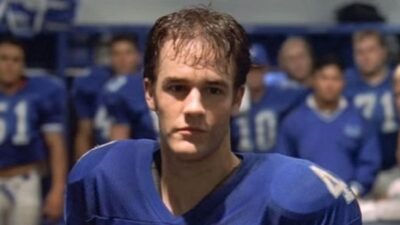 As if the nomenclature in the world of sports didn’t make it tough enough already to distinguish football from football, which needs an “American” qualifier preceding it or a “FOOT-bowl” pronunciation change to separate the two from classifying confusion, now we have this. Last week, the NFL sent out another of its infamous memos (presumably without using their hands, either!). The message distributed to all 32 teams in the NFL’s top flight (ugh) stipulated that faking injuries would no longer be tolerated as a piece of gamesmanship to slow down the opposition; and, instead, would be punished by way of fines, suspensions and loss of draft picks if the league determines that a player was not hurt on a play but was performing an acting job worthy of a Razzie.
As if the nomenclature in the world of sports didn’t make it tough enough already to distinguish football from football, which needs an “American” qualifier preceding it or a “FOOT-bowl” pronunciation change to separate the two from classifying confusion, now we have this. Last week, the NFL sent out another of its infamous memos (presumably without using their hands, either!). The message distributed to all 32 teams in the NFL’s top flight (ugh) stipulated that faking injuries would no longer be tolerated as a piece of gamesmanship to slow down the opposition; and, instead, would be punished by way of fines, suspensions and loss of draft picks if the league determines that a player was not hurt on a play but was performing an acting job worthy of a Razzie.
Let’s say there is a spectrum of professional athletes with respect to how well they are able to play their sport while dealing with some kind of injury. At one end would lay hockey players, who have been observed to compete while having a hockey stick coming out of their head in Phineas Gage fashion.
On the opposite side, you would have soccer players, who have been known to possess the miraculous ability to writhe in pain following the slightest physical contact, yet recover almost immediately if a whistle is not blown. The recent move by the Turkish Football Federation to ban men from games certainly underscores the sports move away from blood and sweat, and closer toward tears. Turkey’s move can have two possible effects: either the sport becomes less violent both on the field, and in the stands, or the amount of soccer-induced hot flashes and cravings for chocolate will increase exponentially.
Even the referees in soccer have not been immune to the Jennifer Lopez School of Acting. Just last week in South America, a match was abandoned after a linesman was unable to continue after being hit on the head with a roll of toilet paper and collapsed to the ground. Perhaps it was shock. Maybe it was because the thoughtless fan had chosen to use the single-ply, less absorbent brand. Either way, the poor schmo will get a ribbing from his friends about how he should have continued to officiate, since he was already on a roll.
While soccer’s hegemony of phony injury-induced shenanigans will likely continue unchallenged, the National Football League is giving the sport something about which to think. In a recent Monday night game, New York Giants safety Deon Grant allegedly feigned a right knee injury in the first quarter that had the St. Louis Rams claiming that he could easily have stepped in for John Travolta’s character in “Battlefield Earth” without missing a beat. After the game, when pressed on the contention of flopping to slow down the opposition’s defense, Grant launched into an explanation of how it was genuinely an injury. And, thus, in the vein of adding “-gate” onto every controversy since the 1970s, Kneegate was born. Grant revealed a swollen right knee, and then impressed the media by enumerating almost every injury he suffered since entering the league. After impressing reporters with his ability of recall he just as quickly disappointed the press with his retort, “I don’t fake nothing.” (If playing in a fantasy league that deducts points for double negatives, drop him immediately.)
Then, last week, Reggie Bush told reporters that, while he was with the Saints, the team had a play where a player would be designated to fake an injury for purposes of stopping play. You may remember Bush — or at least the folks in South Bend do — for his and Matt Leinart’s terribly coordinated reproduction of “Swan Lake” back in 2005, dubiously known as the “Bush Push.” It didn’t really draw rave reviews for execution but, hey, the referees were apparently won over by the performance. Recall the tumult generated last year in college football when it was alleged that a number of Oregon’s opponents had faked injuries against the Ducks, which appeared so contrived that it made campy ‘80s movie “Howard the Duck” look like a cinematographic masterpiece.
Faking is ingrained in American culture. It is a part of who we are. Imagine how many times someone has faked some sort of medical condition to get a three-day weekend: influenza, pregnancy, beriberi. Heck, to this day, people believe that some of the most important moments in US history were staged. The “sinking of the Maine” that led to the Spanish-American War? Some speculate it was done to keep the reign of Spain off the plain. (Translated: to start a war.) The moon landing? Conspiracy theorists will swear they saw a boom mike on the television feed at some point in time after Neil Armstrong emerged from the lunar module. Thanks to the last bastion of credibility on the web, Wikipedia, for reminding the Internet-consuming public that orgasms are roundly faked (another shot to my already unhealthy lack of self-esteem). Unfortunately, a few slices of mango do not work as well for the rest of us as it did for George Costanza.
Celebrity and athlete impostors are roundly documented. You have to wonder how many times someone has passed themselves off as Corey Feldman to get $5 off a pizza, only to find that said celebrity is the one delivering it. Not too long ago, Jose Canseco sent his twin brother Ozzie to fight at a celebrity boxing match. (Editor’s note: as you can tell from the last two references, the word “celebrity” is used loosely these days.) In Washington D.C., there was a Vince Young impersonator running around the Capitol. Authorities got suspicious when they heard there was someone fitting Young’s description actually throwing accurate passes.
In the arena of sports, it should come as no surprise injuries are faked. It can be a deceptive, yet sometimes effective tool to throw off the opposition or just serve as an easy way of getting out of one’s obligations. Speaking of which, I have to end this article now, my fingers hurt.













